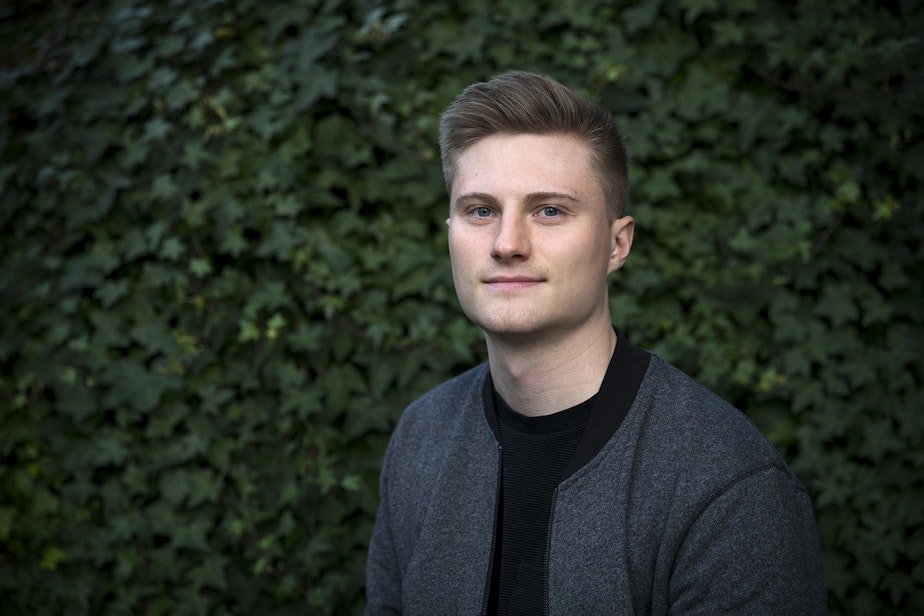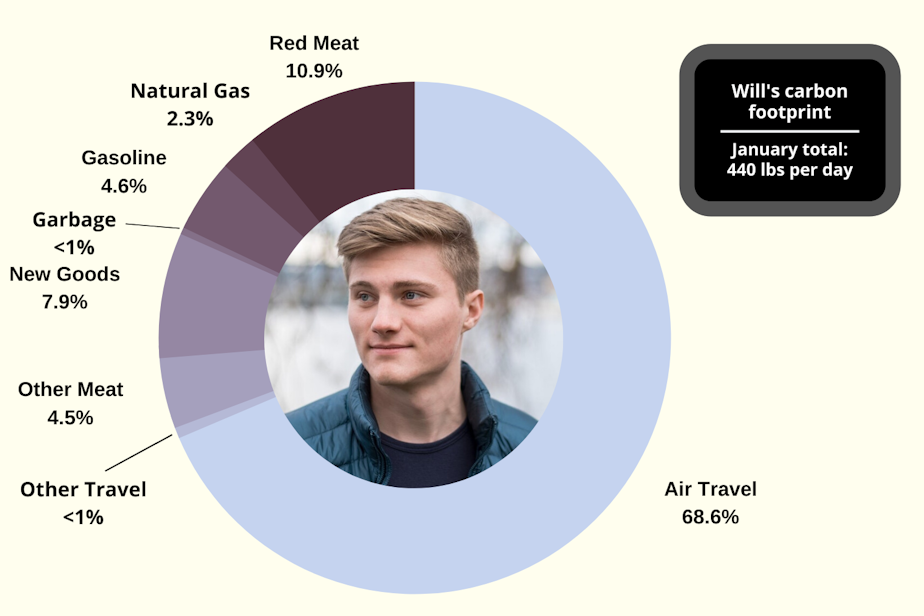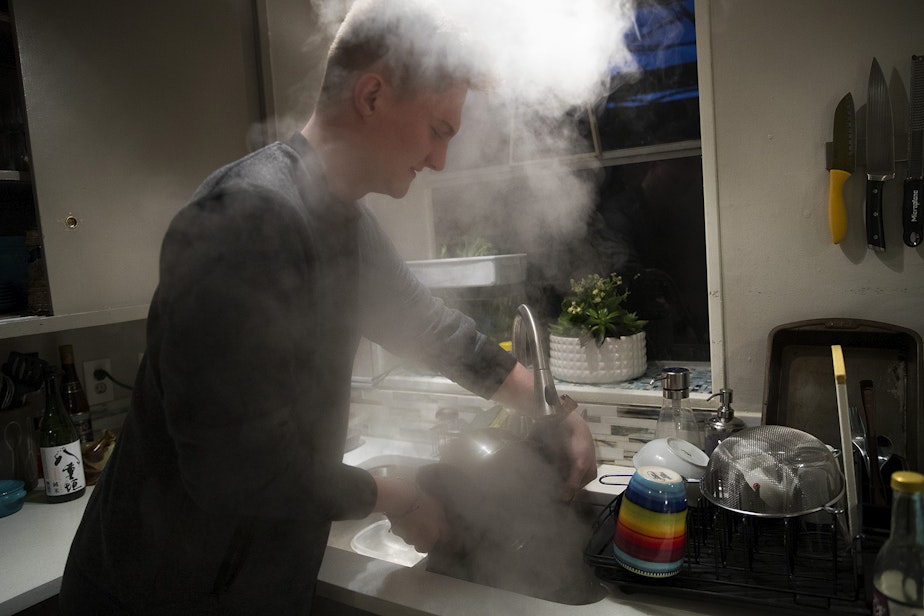Steak and wanderlust – how good living gave Will the biggest carbon footprint in KUOW’s challenge

Fine food and fun travel packs on the carbon pounds.
Will Wilson, a 24-year-old recent college grad who works at Expedia in Seattle, has some carbon-heavy habits.
He loves steak (“It is a go-to.”), drives a gas guzzler (2000 GMC Yukon), and has wanderlust.
“I realized I was on a flight pretty much every weekend at the beginning of last year and going somewhere new.”
He was studying abroad in Spain with trips to Italy, Switzerland, France, Germany, Portugal – to name a few.
Most Americans fly less than one round-trip a year. But not Will.
Sponsored
“Last year I took around 40 flights and 70,000 miles, and that's a huge impact on how much carbon you're putting out.”
Will is a contestant in KUOW’s Biggest Carbon Loser competition. Three contestants are trying to slash their carbon footprint the most in a single month by cutting down on things like car commutes, red meat, and shopping.
Out of all the contestants, Will is the worst offender with the heaviest carbon footprint. His travel takes a heavy toll.
One round-trip, cross-country flight to New York in business class racked up the equivalent of over 4 tons of CO2 emissions, according to the CoolClimate Network research group. It takes the average single American almost two months to put out that much in CO2 emissions.
Some researchers estimate the total annual carbon footprint of a typical U.S. household is 48 tons, or 28 tons for a single person.
Sponsored
(You can calculate your own footprint here)

This January, his lifestyle was more than two and a half times as carbon intensive as the average single American’s, releasing more than 6 tons of carbon dioxide emissions. Plus, Will’s love of fine food and fun travel demonstrates one way, as other researchers estimate, a household’s carbon footprint increases as its income rises.
As part of the Biggest Carbon Loser competition, every contestant gets a coach to help them shed carbon. Will was paired with Tom Watson with King County Recycling and Environmental services.
They recently met to strategize how Will could shed some carbon emissions off his total.
“My gut feeling is that is that the ways you could make an impact would be in the flight travel and eating less red meat especially,” Tom said.
Sponsored
Tom grew up with an ethos of frugality, he said, and it shows.
“Like many parents of the depression generation (mine) had really scant resources to live with and work with. That was more the norm.”
The iPhone in Tom’s pocket is held together with a rubber band and duct tape. “Don’t laugh!” he said, laughing.
Our contestant and his coach run through Will’s carbon tally so far. Every day Will has been logging nine categories of personal carbon emissions, including electricity, goods, and gas consumption. They discuss how Will can meet his need for adventure. After all, Will works at the travel company Expedia for a reason.
“I kind of like the spur-of-the-moment jumping on a flight and going. And it's something that's a little bit easy to do for me through my work. I kind of look at it all day long.”
Sponsored
Travel
And Will is about to face a big temptation. His birthday is coming up over a long weekend – exactly the time Will likes to get out of town.
“Traditionally, what kind of travel has really turned you on or have you really loved?” Tom asks.
“I love to snowboard, so getting to a mountain that’s sometimes not in Washington is something I’ll do.”
They talk about how, instead, Will could go to a local mountain he’s never been to, like Mount Baker. After about 45 minutes with his coach, Will has a plan.
Sponsored
“OK, so this is kind of what I'm thinking is no more driving to work. I can easily take the bus. Cutting out the red meat almost entirely will be my goal. And then maybe I can try an entire month of no new goods. Trying to buy used of everything would be a great way.”
But, Coach Tom tempers Will’s enthusiasm a bit.
“I think it's a great plan, but I wouldn't be too hard on yourself”
Tom says, don’t make extreme changes you can’t sustain and instead focus on making changes that will last.
“By keeping it going and realizing what works for you, that can set a quiet example for others, which is really what's going to change the world eventually, we hope.”
When the competition ends, Will says he will fly again.
Air travel is very carbon intensive. Global emissions from flying are on track to triple in the next thirty years, so climate activists are urging people to fly less.
But there are ways Will can reduce his impact, even when he does fly.
“Our analysis has shown that you can reduce your emissions by about 20-40% by intentionally choosing less emitting flights,” said researcher Sola Zheng with the nonprofit International Council on Clean Transportation.
Less emitting flights are direct flights in economy class on more fuel efficient and newer planes. Air carriers operating the same routes can also have drastically different levels of emissions, Zheng said. But air carriers don’t make that data public, so it’s tricky for consumers to choose flights with lighter carbon footprints.
“We ultimately hope that the travel search engines and carriers can directly provide carbon emissions or carbon intensity data.”
Our contestant, Will, who works in the online travel industry didn’t know this.
“Interesting. Well, maybe I’m going to have to bring up something at work or do a spin-off website or something; ‘This flight you’re buying would put out this much carbon.’ That’d be a cool thing to do, wouldn’t it?”
Low-carbon diet

I visit Will again about three weeks later and find him in the kitchen. At this point in the competition, he’s been trying to shed carbon pounds for about a week. He’s commuting by bus every day, hasn’t been on a flight and doesn’t plan to. This night he’s prepping vegetarian ramen. In fact, he’s been cooking vegetarian a lot.
“It’s fun to experiment with maybe something that I would have made with meat in the past. Definitely something that’s been a lot of fun so far.”
And he hasn’t touched red meat, even though before the competition he was eating one meal a day that included beef. Tonight’s dinner includes homemade ramen broth, 10 toppings and grilled shishito peppers.

I ask if this is usual dinner fare.
“It’s like shocking how often Will will spend three hours making a cheese platter,” roommate Natalie Weed said. “And I’m not exaggerating when I say he’ll spend three hours on a weeknight making a cheese platter.”
That kind of focus has served him well in this competition. The same for his need to explore. Will’s adventurousness has been an advantage as he figures out ways to cut out meat and get around without his car.
Now, he has another advantage: a cut-throat roommate. Will never told Natalie this was a competition. But now that she knows, Natalie wants Will to win.
“Oh yeah. We’re going to win now. The house doesn’t need to be heated.”
“Just to be clear, this is my competition,” he chimes in.
After I leave that night, Natalie goes straight to the thermostat and turns down the heat.
Stay tuned! We will reveal the winner of KUOW’s Biggest Carbon Loser contest at our That's Debatable event March 11.

